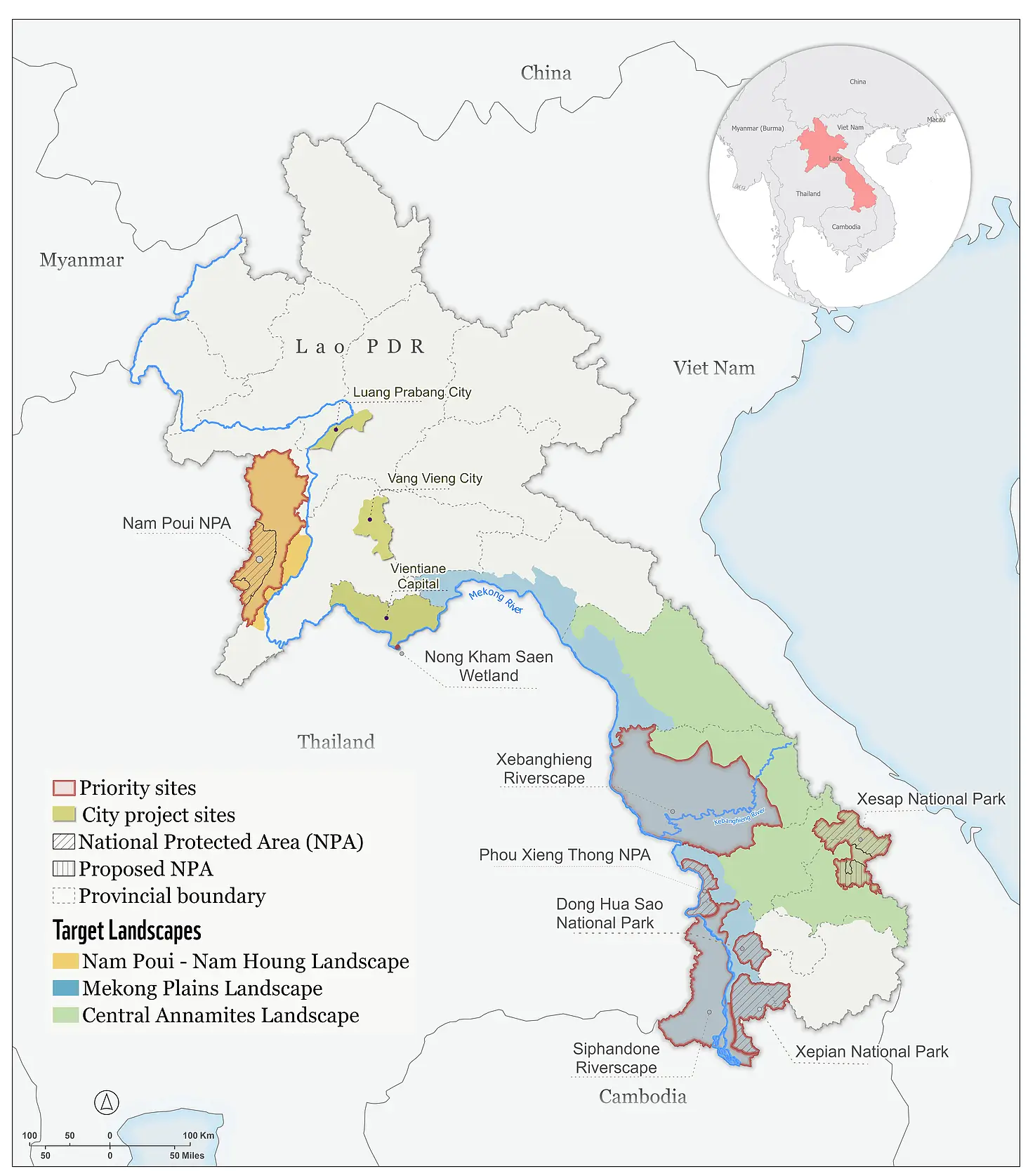The WWF is run at a local level by the following offices...
- WWF Global
- Adria
- Argentina
- Armenia
- AsiaPacific
- Australia
- Austria
- Azerbaijan
- Belgium
- Bhutan
- Bolivia
- Borneo
- Brazil
- Bulgaria
- Cambodia
- Cameroon
- Canada
- Caucasus
- Central African Republic
- Central America
- Central Asia
- Chile
- China
- Colombia
- Croatia
- Democratic Republic of the Congo
- Denmark
- Ecuador
- European Policy Office
- Finland
WWF has had a presence in Laos since the late 1980s, with the WWF-Laos office officially established in 2001. Today, our head office is located in Vientiane Capital, supported by five field offices across the country and a team of over 75 staff members working with partners to advance conservation efforts.
Our programmes focus on four key thematic areas: Forests, Freshwater, Wildlife and Circular Resilience. Activities are implemented across eight key priority sites within three landscapes and also extend to three key urban areas in Laos.

OUR MISSION
OUR MISSION FOR LAOS IS TO BUILD A FUTURE WHERE THE PEOPLE OF LAOS CAN THRIVE AND LIVE IN HARMONY WITH NATURE.
By working in partnership with the Government of Laos, civil society organizations, the private sector, stakeholders, communities, and both local and international organizations, we aim to address threats to biodiversity and promote a nature-based, sustainable future. Our work seeks to ensure long-lasting benefits for both people and wildlife.
This mission aligns with WWF’s global mission: To stop the degradation of the Earth’s natural environment and to build a future in which humans live in harmony with nature by:
Our mission for Laos contributes to WWF’s global mission: to stop the degradation of the earth’s natural environment and to build a future in which humans live in harmony with nature by:
- Conserving the world’s biological diversity
- Ensuring that the use of renewable natural resources is sustainable
- Promoting the reduction of pollution and wasteful consumption.

Where We Work: Sites & Landscapes Map
WWF-Laos’ conservation efforts across Forests, Freshwater, Wildlife and Circular Resilience – our four key thematic areas – are geographically focused within three landscapes:
- Nam Poui-Nam Houng
- Mekong Plains
- Central Annamites
Within these landscapes, we concentrate our work on eight priority sites chosen for their conservation significance, the pressures they face, and our capacity to make a meaningful impact.
These sites below are recognized for their high conservation value due to their unique ecosystems, critical habitats, and the presence of some of the world’s most endangered species. Additionally, these areas play a vital role in regional ecosystems and have significant socio-economic importance both nationally and regionally.
- Nam Poui Protected Area
- Phou Xieng Thong Protected Area
- Xesap National Park
- Xepian National Park
- Dong Hua Sao National Park
- Xebanghieng Riverscape
- Siphandone Riverscape
- Nong Kham Saen Wetland
Our work on plastics and waste management is being implemented in three key cities:
- Luang Prabang City
- Vang Vieng City
- Vientiane Capital

OUR OFFICES
WWF-Laos: House No. 39, Unit 05, Saylom Village, Chanthabouly District, Vientiane Capital, Laos.
Tel. +856 21 216080
E-mail: wwf-laos@wwf.org.la
The first activity WWF brought to Laos supported initial biodiversity surveys, including for the kouprey, and contributed to the establishment of Laos’ protected area system.
Establishment of the WWF-Laos office, marking the start of a formal partnership with the Lao government to support conservation efforts,
Opening of the provincial coordination office in Champasak province.
Opening of provincial coordination offices in Salavan and Xekong provinces.
Opening of the provincial coordination office in Savannakhet province.
Opening of field offices in Khongxedon and Khong districts; closure of the Xekong provincial office in the same year.
Opening of offices in Luang Prabang and Sayaboury provinces.
Adoption of the 2030 Roadmap and Preparation for the Kick-off of WWF-Laos’ 5-Year Strategy.